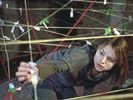Eye For Film >> Movies >> Écoute Le Temps (2007) Film Review
We tend to think of cinema as a visual medium, but watch any film with the soundtrack switched off and you will find that the experience is greatly diminished. William Friedkin's The Exorcist (1973), Francis Ford Coppola's The Conversation (1974) and Brian de Palma's Blow Out (1981) have all in different ways explored the impact and ambiguity of recorded sound - and now Écoute Le Temps, the feature debut of writer/director Alanté Kavaïté, once again places acoustics at its heart.
Long estranged from her family, documentary sound recordist Charlotte (Émilie Dequin) is shocked to learn that her mother (Ludmila Mikaël), a gifted clairvoyant, has been murdered. Hoping for answers, Charlotte moves back into the crumbling farmhouse where she had spent her childhood, and begins listening keenly for clues to what might have happened. The small rural community turns out to be a hotbed of agricultural malpractice, adulterous intrigues, chemical pollution and child disappearances - and only the town 'witch' was privy to everyone's darkest secrets, so there are many who might have wanted her dead. Then, late one night, when a bored Charlotte begins recording the creaking sounds in her mother's house, she discovers she has inherited her very own sixth sense - an ability to hear sounds from the past - which might just lead her to the identity of the killer.

Écoute Le Temps takes that stalest of subgenres, the village green murder mystery, and turns it inside-out to invigorating effect. For here the detective is no crusty Miss Marple figure, but a young grieving woman whose intuitions arise not out of plodding detective work but from her nascent paranormal sensitivities. Kavaïté leaves no time for awkward exposition, but instead simply shows us Charlotte's point of view as she opens herself to the idea that the farmhouse is a network of trapped memories, with her mother's last moments at its epicentre.
As Charlotte records different spaces in the room, we are afforded a series of spiraling flashbacks from the mother's earlier life with Charlotte to her later life alone, zeroing in on her last moments. In an arresting image straight out of David Cronenberg's Spider (2002), the strings that Charlotte stretches across the room to mark the different recording locations soon resemble nothing less than an arachnid's web, with Charlotte (note the spidery name) gradually circling her oblivious prey.
The problem, however, is that Écoute Le Temps is all moody set-up with no real follow-through - like an initially striking sound that has been dampened before it can resonate. The many suspects are mere caricatures, too sketchy to engage our interests, and if we are honest the same is true even of the haunted protagonist. The solution, when it comes, is too arbitrary to satisfy, and its revelation may well be found a tad understated even by fans of the subtlest sort of cinema. In the end the film, like the farmhouse, collapses in on itself, its great premise unable to be supported by so poor a structure.
As Agnieszka Holland has proved with Olivier, Olivier (1992), it is possible to craft an exquisite film around a bucolic setting, a broken family, a missing child and a soupçon of the supernatural. Alanté Kavaïté has not quite managed to repeat Holland's success, but Écoute Le Temps hints, at least in its first half, at the emergence of a visionary new talent. Let's hope we will be hearing more from her soon.
Reviewed on: 01 Aug 2007

















